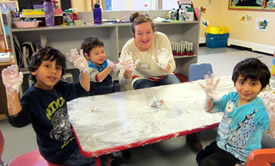What it Means to be Kindergarten Ready
Posted on April 25, 2016
1 comments 1636 Views
By Lauren Peterson, Nate Winegardner, and Tom Udell for The Center on Early Learning
There is a lot of discussion throughout the state
these days about “kindergarten readiness” – what it means, how to measure it,
why it’s important, and how to accomplish it. There are many answers offered to
each of these questions.
We at the Center on Early Learning (part of The Research Institute at Western Oregon University) have decades of experience in the field of early childhood education and development and have been asked by many of our colleagues to weigh in on this topic.
The many articles and blog posts written, as well as the passionate responses to them, is evidence of the collective concern we share that all of Oregon’s children have early childhood experiences that ensure bright and promising futures.
What is Kindergarten Readiness?
There are a number of different
ways to define “kindergarten readiness” and still a great deal to be learned
before it can be definitively stated which factors ensure that young children
will experience long term success in school. What we can agree on is that children
have needs that must be met for optimal social, emotional, and cognitive
development in the early years.
When these needs are met, it could be argued that a child would enter
kindergarten ready to positively engage with peers and teachers, think
creatively, solve problems and examine the world through a lens of curiosity
and wonder.
Enthusiasm, eagerness to learn and the skills to succeed
 We at the Center on Early Learning (CEL) are committed to
the goal of children arriving for their first day of kindergarten with
enthusiasm, eagerness to learn and the skills to succeed both socially and
academically. Performing assessments in the first week of kindergarten that includes
measures of letter recognition and
numeracy concepts can provide valuable
data, however we are concerned
that this not be mistaken for the type of instruction and support children
need. To this end, we believe that
the importance of children's participation in high quality early childhood care and education programs cannot
be overstated.
We at the Center on Early Learning (CEL) are committed to
the goal of children arriving for their first day of kindergarten with
enthusiasm, eagerness to learn and the skills to succeed both socially and
academically. Performing assessments in the first week of kindergarten that includes
measures of letter recognition and
numeracy concepts can provide valuable
data, however we are concerned
that this not be mistaken for the type of instruction and support children
need. To this end, we believe that
the importance of children's participation in high quality early childhood care and education programs cannot
be overstated.
High quality programs
High quality programs are those that are language rich, developmentally appropriate, and provide children with secure attachments to highly qualified teachers and caregivers. These programs engage families as partners and reflect the families’ culture and language. We also believe accessibility and affordability are crucial factors in ensuring that all children have the opportunity for these important early childhood experiences. These programs support the development of children’s ability to socialize with their peers, sharing and taking turns, and problem solving developmentally appropriate tasks.
Oregon's investment in young children
We are grateful to live in Oregon, a state that clearly has the best interests of young children in mind as it provides funds and resources to early childhood development initiatives across the state. One such initiative, Oregon’s Quality Rating and Improvement System, is invested in increasing the quality of our early learning and development programs. This measure focuses on the relationship between program quality and what we know children need for optimal development in the early years through a set of research based standards focusing on learning, families, professional development and sound business practices. Currently, nearly 40,000 children in Oregon are enrolled in programs participating in QRIS.
With open minds, we will continue to evolve
Education, in early childhood
and beyond, has never been a static concept. With open minds, we will continue
to evolve in our understanding of how to best serve the educational needs of
our children. At the same time, we must do everything in our power to preserve
the integrity of these early years and help children develop healthy minds and
bodies, a joyful anticipation of their futures, as well as the attitudes
towards learning that will serve them for the rest of their lives. With that
vision at the forefront, the human and financial resources being invested in
early childhood programs in Oregon will be time and money very well spent.
The Center on Early Learning works to improve the quality of care and education available to all young children and their families in order to promote optimal development and full inclusion. We are happy to be part of the ongoing conversation about early learning systems in Oregon and how they are working to prepare young children for success in kindergarten. CEL coordinates Oregon's QRIS for the Oregon Department of Education.
Recent Blog Posts
Project Spotlight: Creating Supports for Survivors of Gender-Based Violence Jun 6, 2018
Project Spotlight: Investigating Executive Function Concerns in Infants and Toddlers May 23, 2018
Project Spotlight: Reaching Out to an Underserved Population May 9, 2018
Project Spotlight: Fighting Against Gender-Based Violence Mar 14, 2018
Project Spotlight: Increasing Diversity in Early Childhood Educators Feb 7, 2018

Very inspirational! Thank you all!
Posted May 4, 2016 by Jill Ramirez